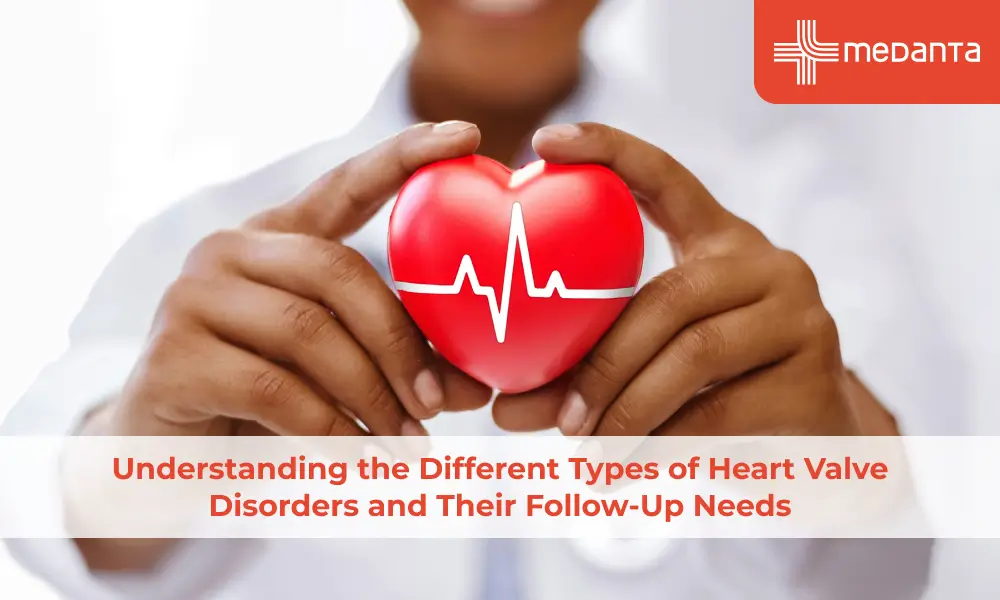Understanding the Different Types of Heart Valve Disorders and Their Follow-Up Needs

TABLE OF CONTENTS
Steady blood flow is what drives your body, its functioning, and health. But what help maintain a steady blood flow? It’s the heart valves. Connected to a chamber of the heart, the four heart valves ensure that blood flows steadily in the right direction without any backward leakage.
When having heart valve disorders, they could impact the functioning of heart valves. If left untreated, heart valve diseases can cause your heart to work harder or, at worse, can cause deadly ventricular arrhythmia or heart failure.
In this article, you can explore what heart valves are, the types of valve disorders, their symptoms, causes, diagnosis, and treatment.
What are Heart Valves?
Your heart has four valves, each connected with one of the organ’s four chambers. These heart valves open and close with each heartbeat, allowing blood to flow through the upper chambers (atria) and lower chambers (ventricles).
The heart has the following four valves:
The tricuspid valve: This valve sits between the right atrium and ventricle, carrying the blood from the top to the bottom.
The pulmonary valve: Sitting between the right ventricle and the pulmonary artery, the pulmonary valve takes blood from the right ventricle to the pulmonary artery, which further carries it to your lungs.
The mitral valve: Once blood becomes oxygenated, it travels back to the heart’s left atrium. Sitting between the left atrium and ventricle, the mitral valve carries blood from the left atrium to the left ventricle.
The aortic valve: Connecting the left ventricle to the aorta, the aortic valve allow blood to leave your heart and circulate throughout the body.
Knowing the Types of Heat Valve Disorders
The name for heart valve disorders resembles the valve they affect and the specific problem causing them. The following discussed are common types of heart valve disorders you might experience:
Mitral Valve Prolapse
Mitral valve prolapse, called click-murmur syndrome, floppy valve syndrome, Barlow’s syndrome, and balloon mitral valve, occurs when the mitral valve fails to open and close properly. Sometimes, it can cause significant amounts of blood to flow backwards to the left atrium, which is referred to as regurgitation.
Valvular Stenosis
Valvular stenosis is another heart valve disorder that occurs when the valve doesn’t open completely, and thus, enough blood isn’t able to flow through the valve. This disorder can occur in any of your heart valves, and valve thickening or stiffening can be the common cause.
Valvular Regurgitation
Also called leaky valve, mitral or tricuspid regurgitation, valvular regurgitation takes place when the heart valves fail to close properly, causing blood to flow backwards. It can lead to lung inflammation, swelling, or congestion.
Bicuspid Aortic Valve Disease
Usually, the aortic valve has three flaps. However, if you are born with an aortic valve that has two flaps, it means you are diagnosed with bicuspid aortic valve disease. Often, it’s until adulthood that people aren’t diagnosed with this heart valve disorder as the valve is able to function smoothly for years without causing any symptoms.
What are the Symptoms of Heart Valve Disorders?
The heart valve symptoms can vary from person to person, depending on the severity of the disorder. Usually, many people with mild or moderate heart valve disease don’t experience any major symptoms. However, the presence of the following symptoms might indicate the disorder is affecting the blood flow:
Shortness of breath at rest or when active
Irregular heartbeat
Fatigue
Palpitations
Feeling lightheaded or fainting
Chest pain
Weight gain
Inability to maintain a regular activity level
Exercise intolerance
Swollen abdomen, ankles, or feet
Headaches and cough
Pulmonary edema
What Causes Heart Valve Disorders?
You might suffer from heart valve conditions due to any of the following listed causes:
Rheumatic fever
High blood pressure
Thoracic aortic aneurysm
Degeneration or calcification of valve tissue
Heart attack
Infective endocarditis
A birth defect
Coronary artery disease
Lupus
Syphilis
Cardiomyopathy
Atherosclerosis
Hypertension
Diagnosis of Heart Valve Disorders
The first thing any doctor does to diagnose a heart valve disorder is listen to your heartbeat with a stethoscope. If they hear your heart murmuring or producing unusual sounds, they might refer to the following tests:
Echocardiogram: It creates an image of your heart, valves, and blood flowing across them via an ultrasound
Cardiac MRI: It creates still and moving images of your heart to help doctors detect issues with its structure and function
Chest X-ray: To detect problems in your heart structure.
Electrocardiogram: It measures the impulses from a heartbeat.
Cardiac catheterization: It involves placing a catheter inside your heart to assess its health.
Stress test: It involves a patient performing an activity while a doctor measures his heart performance.
Treatment of Heart Valve Disorders
The heart valve disease treatment can vary depending on the disorder’s severity, causes, and symptoms. Sometimes, it’s enough to follow a conservative treatment like getting consistent medical supervision, following a healthy diet, or quitting smoking to treat your heart valve disease.
Medications
However, severe valve disorder might require appropriate medications and surgery. Usually, cardiologists recommend the following medications to manage your heart valve condition:
Beta-blockers or calcium channel blockers to control heart rate and blood flow
Vasodilators that dilate or open blood vessels and lower blood pressure
Diuretics to reduce fluid retention
Surgery
You might need surgery to repair or replace the affected heart valve. Heart valve repairing surgery might use one of the following:
Your tissue
A donated valve
A mechanical or artificial valve
An animal valve when having a biological valve replacement
Furthermore, valve replacement surgery might involve minimally invasive or open-heart procedures.
Final Words
Heart valve conditions can affect your heart’s functioning and health. So, getting a proper diagnosis and treatment is crucial if you suspect the relevant symptoms. However, not every individual with a valve disease has symptoms. Book an appointment with renowned cardiologists at Medanta to determine whether you have a heart valve disorder, its cause, and appropriate treatment.






